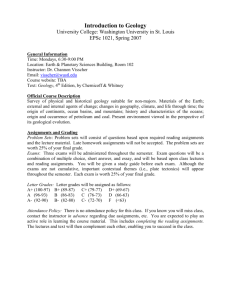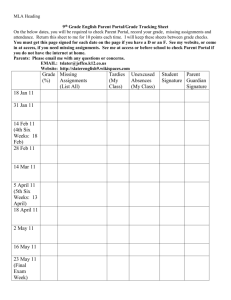advanced composition
advertisement
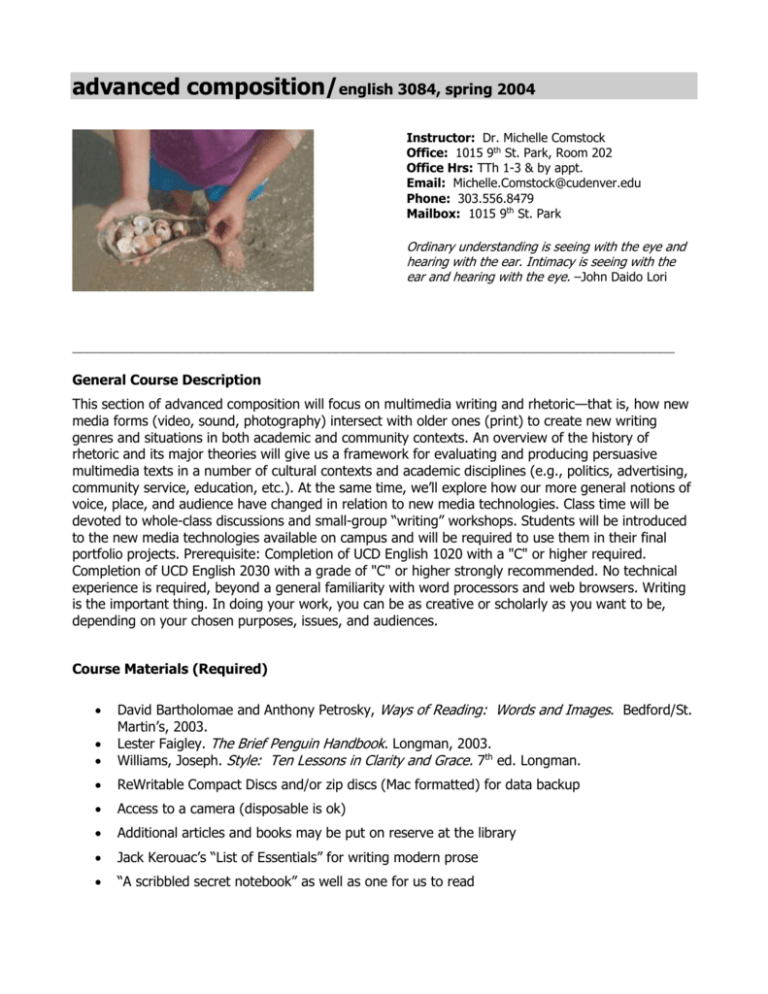
advanced composition/english 3084, spring 2004 Instructor: Dr. Michelle Comstock Office: 1015 9th St. Park, Room 202 Office Hrs: TTh 1-3 & by appt. Email: Michelle.Comstock@cudenver.edu Phone: 303.556.8479 Mailbox: 1015 9th St. Park Ordinary understanding is seeing with the eye and hearing with the ear. Intimacy is seeing with the ear and hearing with the eye. –John Daido Lori ________________________________________________________________________________ General Course Description This section of advanced composition will focus on multimedia writing and rhetoric—that is, how new media forms (video, sound, photography) intersect with older ones (print) to create new writing genres and situations in both academic and community contexts. An overview of the history of rhetoric and its major theories will give us a framework for evaluating and producing persuasive multimedia texts in a number of cultural contexts and academic disciplines (e.g., politics, advertising, community service, education, etc.). At the same time, we’ll explore how our more general notions of voice, place, and audience have changed in relation to new media technologies. Class time will be devoted to whole-class discussions and small-group “writing” workshops. Students will be introduced to the new media technologies available on campus and will be required to use them in their final portfolio projects. Prerequisite: Completion of UCD English 1020 with a "C" or higher required. Completion of UCD English 2030 with a grade of "C" or higher strongly recommended. No technical experience is required, beyond a general familiarity with word processors and web browsers. Writing is the important thing. In doing your work, you can be as creative or scholarly as you want to be, depending on your chosen purposes, issues, and audiences. Course Materials (Required) David Bartholomae and Anthony Petrosky, Ways of Reading: Words and Images. Bedford/St. Martin’s, 2003. Lester Faigley. The Brief Penguin Handbook. Longman, 2003. Williams, Joseph. Style: Ten Lessons in Clarity and Grace. 7th ed. Longman. ReWritable Compact Discs and/or zip discs (Mac formatted) for data backup Access to a camera (disposable is ok) Additional articles and books may be put on reserve at the library Jack Kerouac’s “List of Essentials” for writing modern prose “A scribbled secret notebook” as well as one for us to read 2 Course Opportunities The course is designed to help you to accomplish the following: Help you understand and analyze writing situations and media technologies and invoke the roles and strategies necessary to produce effective writing in localized and globalized contexts Improve your understanding of how multimedia writing practices and genres (e.g., narratives, proposals, manifestos, profiles, position pieces, tutorials, etc.) function within and across various online and offline contexts, including how various readers read, where readers look for information, and what multiple purposes documents serve inside and outside particular organizations Help you produce more effective visual, textual, and multimedia projects Give you opportunities to collaborate with colleagues on reading, writing, and design projects Help you learn new multimedia technologies and their various rhetorical/practical/political applications Course Policies Attendance Regular attendance is necessary if you want to receive credit for your work. In a writing class, you do much of the important brainstorming and revision work in the classroom. Most of the learning will be experiential in that you will understand important rhetorical concepts by engaging in class communication and writing activities. While a small portion of class will be dedicated to short lectures, the majority of it will involve intense, sometimes collaborative, writing workshops. Thus, you may not make up missed in-class assignments unless your absence is an excused one (due to illness, certain official university functions, mandatory religious obligations, military obligations, and special circumstances outside your control). It is your responsibility to contact me prior to the graded assignment date and to verify the nature of the special circumstances. Regular tardiness will also affect your own and your group’s performance. Since some of the class time will be devoted to group work, groups will be responsible for creating policies regarding missing and late work. Those policies will be turned into me and reviewed periodically throughout the semester. Assignments 1) You must complete all major assignments or you will fail the class. 2) Your assignments should be presentable. If you hand in poorly proofread documents, I will return them to you for correction before they are graded. 3) If you miss class, it is your responsibility to find out the assignments you missed and be prepared for the next class. 3 Late Work You should submit your work on time, usually at the beginning of class on the due date. One-half letter grade will be taken off the paper’s final score each day it is late. You are responsible for making and keeping a back-up copy of all assignments you submit. Grading I grade on a 90-80-70-60 grading scale. If, for example, the assignments total 1400 points, then a 1260 or more merits an “A.” 1120-1259 at “B,” and so on. Academic Ethics and Plagiarism You must do your own original work in this course—and appropriately identify that portion of your work which is collaborative with others, or borrowed from others, or which is your own work from other contexts. Whenever you borrow graphics, quote passages, or use ideas from others, you are legally and ethically obliged to acknowledge that use, following appropriate conventions for documenting sources. If you have doubts about whether or not you are using your own or others’ writing ethically and legally, ask me. Follow this primary principle: Be up front and honest about what you are doing and about what you have contributed to a project. If I suspect plagiarism, I will discuss the incident privately with the student before issuing any penalties. Penalties for plagiarism will depend upon the nature of the assignment. If you wish to submit the same work or use the same research (in whole or in part) for more than one course, you must obtain permission to do so from all instructors involved. According to the UCD Course Catalog: Plagiarism is the use of another person’s distinctive ideas or words without acknowledgement. The incorporation of another person’s work into one’s own requires appropriate identification and acknowledgement, regardless of the means of appropriation. The following are considered to be forms of plagiarism when the sources is not noted: 1. Word-for-word copying of another person’s ideas or words 2. The mosaic (the interspersing of one’s own words here and there while, in essence, copying another’s work) 3. The paraphrase (the rewriting of another’s work, yet still using their fundamental idea or theory) 4. Fabrication (inventing or counterfeiting sources) 5. Submission of another’s work as one’s own. 6. Neglecting quotation marks on material that is otherwise acknowledged Acknowledgement is not necessary when the material used is common knowledge. 4 Code of Conduct All members of the course must commit to creating a place of study where everyone is treated with respect and courtesy. Everyone must share in the commitment to protect the integrity, rights and personal safety of each member of the class community. This includes helpful, yet courteous, discussion of individual and group writing projects. Reasonable policies regarding group member behavior and contributions will often be determined by the group as a whole, and member grades will depend in part upon one’s adherence to these policies. Students with Disabilities I will make accommodations for in-class work or due dates for students who register with CUDenver’s Disability Services Office, AR 177P (303-556-8387). The accommodations will depend upon the disability and nature of the assignment. Major Project You will complete one major project (see description below), as well as a number of smaller individual reflection writing, workshop, and design activities. Collaborative Multimedia Documentary Project on a campus and/or community figure, organization, event, issue, or political movement. The project will utilize at least three types of media—photographic, print, and video—to represent a “local” person, group of people, event, political movement or issue. This project is adapted from the assignment sequence on page 438 of Ways of Reading Words and Images. We are taking Robert Coles’ The Tradition: Fact and Fiction as an invitation to do documentary writing. The assignment has two parts. For the first part, your group will create a written documentary in which you represent some aspect of a person, figure, organization, issue, event or, to use the language of the essay, in which you are in pursuit of a moment of “human actuality.” The “text” your group creates can include photographs, interviews, observations, hypertextual links, sound, video—whatever is available and appropriate. The point is for you to feel what it is like to be responsible, as a writer, for representing someone else, his or her values, words, and actions. The second part of your project will include an explanation about why you chose a particular digital (or nondigital) medium for your message. Assignments leading up to this final project will include: 1) reflective writing on the relationships between words and images, the rhetorical and design strategies writers use to communicate effectively, collaborative writing; 2) a group photo-essay; and 3) rough drafts, design sheets, and peer review responses for the final project. ENGL 3084 COURSE SCHEDULE Please do not become too attached to this schedule. All assignments and due dates are subject to change. Week Two Jan. 26: Discuss reading assignment (PH 1-25); Apply rhetorical analysis to sample texts; Assignment to read PH151-61, Writing for the Web Jan. 28: Scott Slack and Scott Randolph from Digital Landscapes will discuss media literacy; Discuss principles of digital literacy and review Digital Landscape Web site; Assignment to choose documentary topic and email your selection to me by Friday, Jan. 30 at 5:00 p.m. Include the following in your email: The subject of your project, the significance of your project (who will benefit from it and why), and your relationship to or levels of access to the subject. For example, as a 5 member of the group, do you have regular access to it or what kinds of limits (of confidentiality and copyright) will hinder your access to the subject. Week Three Feb. 2: Formation of groups, discussion of group division of labor and production policies. Group policy due at the end of class. Assignment is to read Coles’ “The Tradition” Feb. 4: Discuss Coles’ essay. Assignment is to collect a photo-essay documenting a particular subject (similar to your own if possible). Analyze it according to Coles’ criteria for good documentary writing. Week Four Feb. 9: Discuss documentary samples in groups. Assignment is to read Mitchell’s “The Photographic Essay.” Begin photographing site/subject. Feb. 11: Discuss Mitchell’s essay. Assignment is to continue photographing site/subject. Week Five Feb. 16: Video Workshop with Scott Slack and Scott Randolph. Feb. 18: In-class review of photographs, video footage, or background information. You will leave class with a set of research questions and a plan. Assignment for Feb. 25 is to continue research and read Agee and Evans’ Let Us Now Praise Famous Men. Week Six Feb. 23: Research/Photoshop Workshop Feb. 25: Discuss Documentary Writing (Agee and Evans) and the Gaze. Assignment is to continue research. Week Seven Mar. 1: Video Editing/Premiere workshop. Assignment is to continue research and read Barthes’, Camera Lucida. Mar. 3: Discuss Barthes. Assignment is to continue research. Week Eight Mar. 8: Research and Writing workshop Mar. 10: Extended outline and/or storyboard due for presentation to group Week Nine Spring Break Week Ten Mar. 22: Writing/Premiere Workshop Mar. 24: No Class Week Eleven Mar. 29: Daniel Weinshenker from the Center of Digital Storytelling on the importance of tension in storytelling (and in the documenting of lives). Mar. 31: Writing Workshop Week Twelve Apr. 5: Conferences w/ Michelle 6 Apr. 7: Conferences w/Michelle Week Thirteen Apr. 12: Document Design/Style Workshop Apr. 14: Document Design/Style Workshop Week Fourteen Apr. 19: RevisionWorkshop—Scott Slack and Scott Randolph will review multimedia projects Apr. 21: Revision Workshop Week Fifteen and Sixteen (April 26-May 5) Documentary Presentations Final Exam—“Letter to Coles”


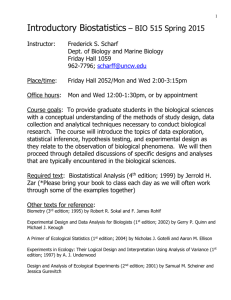
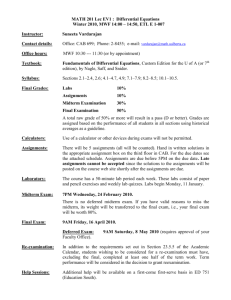
![BIOS430 Evolution, Spring Semester 2016 Syllabus [v1.0]](http://s3.studylib.net/store/data/008212911_1-eda4846995a3f3a1f17c130a72ee789b-300x300.png)

